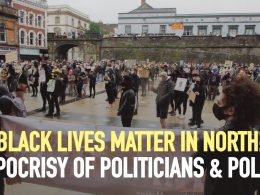The fall-out from the controversy around the flying of the union flag at Belfast City Hall brought into sharp relief the deep, sectarian divisions which remain a reality of life in Northern Ireland. Tensions were decisively heightened and feelings have been hardened in both communities.
While the protests and riots have subsided, the frustrations which provoked them have not gone away. Any number of issues could cause this simmering anger to explode to the surface again, perhaps with renewed intensity.
Both nationalist and unionist politicians manipulated the flags issue for their own ends, demonstrating their irresponsible disregard for the lives of ordinary people. It’s clear, however, that they were taken aback by the reaction that the issue provoked and scrambled to bring the situation back under control. One might assume that the politicians would now shy away from whipping up tensions. Instead, politicians from both sides at City Hall have again attempted to turn issue after issue into sectarian sparring matches. We now face into a marching season fraught with the threat of sectarian conflict, potentially on a considerably higher level than recent years.
Working class communities will bear the brunt of any upturn in sectarian violence. Heightened sectarian tensions in society can impact on every sphere of people’s lives, including spilling into the workplace. During the height of the flags conflict, there were a number of incidents of sectarian threats being made against workers – both Catholic and Protestant – in their workplace. This is a glimpse of the danger that sectarianism poses for the workers’ movement – a danger the trade unions must recognise and prepare to counter.
The trade union movement has a unique role to play in challenging sectarianism, as the only mass organisation that unites workers from both communities to fight for their common interests. At key points during the course of the ‘Troubles’, the trade union movement was able to mobilise ordinary workers in united action – such as demonstrations, walk-outs and strikes – in response to sectarian threats or attacks and isolate sectarian forces. The Socialist Party has written in depth about this history elsewhere and will do so again. This tradition must now be returned to.
Socialist Party activists in NIPSA and Unite have – alongside others – put motions on this issue to the upcoming union conferences. These motions would commit the unions to actively challenge sectarianism. In particular, they call on the leaderships to send a clear message to shop stewards and activists that they will have the union’s full backing if they choose to take industrial action in response to sectarian threats and intimidation. A similar motion has already been passed by the recent conference of NUS-USI, the students’ movement in Northern Ireland.
In the context of a fresh bout of sectarian conflict and attacks, even a small group of workers taking united action to counter sectarian harassment could have a decisive impact. It could act as a beacon for working class people – the vast majority of whom are opposed to any return to sectarian conflict – and give confidence that it is possible to challenge sectarian forces. Particularly if backed in a real way by the trade union leadership, such a stand could potentially be a turning point away from a slide towards conflict.
This discussion on how the union movement can challenge sectarianism must not be isolated to the floors of conference halls. All union activists should take it into their branch and their workplace and lay the ground for a response to a rise in sectarianism. These preparations must go hand in hand with a renewed discussion on how the unions can challenge the austerity agenda of the Orange and Green Tories at Stormont and their masters at Westminster, which is devastating working class communities. The most effective way that we can challenge sectarianism is to bring workers from both communities together in struggle for our common interests.











